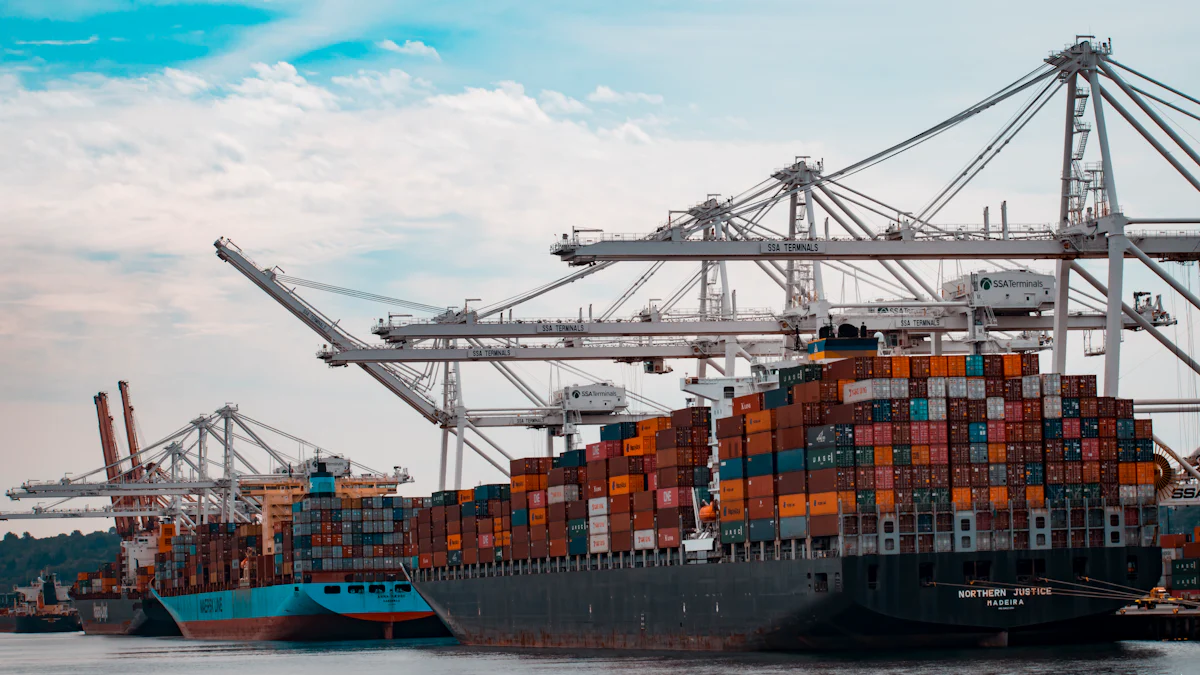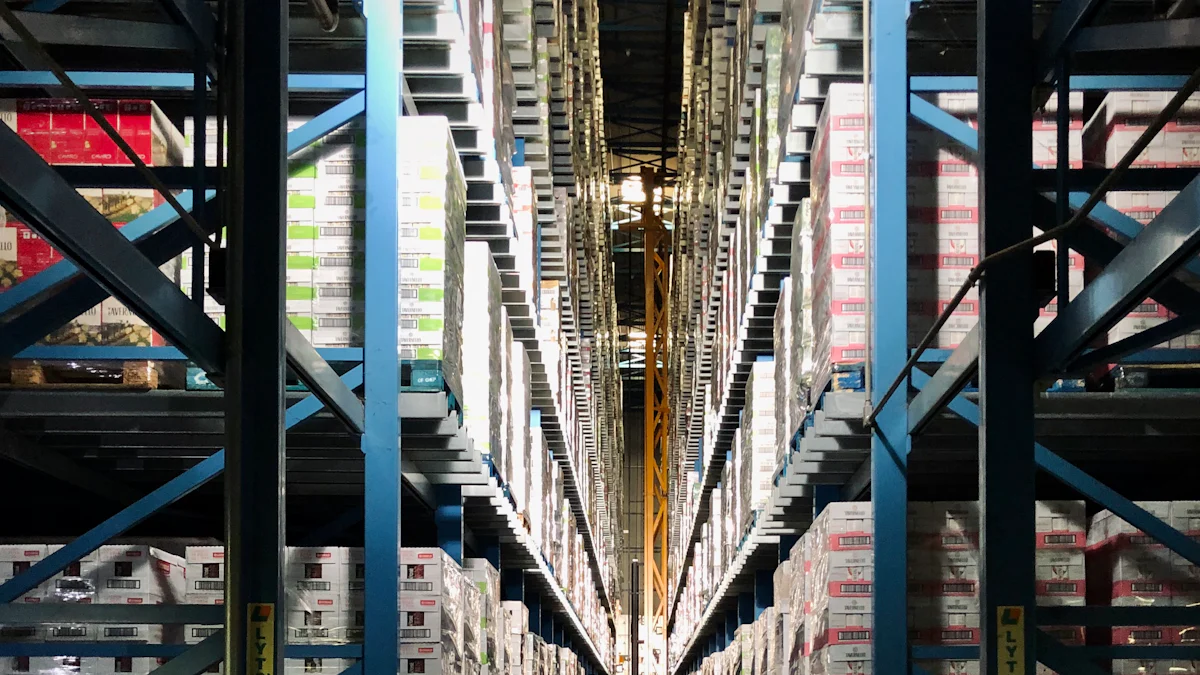How Technology is Transforming the Logistics Industry

The logistics industry, valued at 9.41 trillion U.S dollars in 2023 and projected to exceed 14.08 trillion U.S dollars by 2028, is undergoing a significant transformation. Tech logistics plays a pivotal role in modern logistics, driving efficiency and innovation. Key technologies such as artificial intelligence, real-time visibility, Internet of Things (IoT), and robotics are reshaping the industry landscape. Embracing these advancements is crucial for businesses to stay competitive and meet evolving consumer demands.
The Role of Automation in Logistics

Warehouse Automation
Automated Storage and Retrieval Systems (AS/RS) revolutionize warehouse operations by integrating various digital, robotic, and racking elements. This technology optimizes space utilization, enhances accuracy, and boosts productivity through automated storage and retrieval processes. AS/RS systems offer benefits such as increased storage density, improved efficiency, reduced labor costs, and enhanced safety.
Robotics in warehousing further advances automation by introducing cutting-edge technologies like shuttles, cranes, Autonomous Mobile Robots (AMRs), carousels, Vertical Lift Modules (VLMs), Micro-Loads, Mini-Loads, Unit-Loads, stockers, among other systems. These robotic solutions are often seamlessly integrated with Warehouse Execution Systems (WES), Warehouse Management Systems (WMS), Warehouse Control Systems (WCS), or other software and controls to create a highly efficient and streamlined warehouse environment.
Transportation Automation
Autonomous Vehicles are at the forefront of transportation automation in the logistics industry. These self-driving vehicles leverage advanced technologies to navigate roads autonomously, enhancing delivery speed and efficiency while reducing human errors. The integration of autonomous vehicles into logistics operations is reshaping the transportation landscape by offering a more reliable and cost-effective solution for goods movement.
Drone Deliveries represent another innovative approach to transportation automation. Drones enable swift and direct deliveries to remote or congested areas that are challenging for traditional vehicles to access promptly. By leveraging drone technology in logistics operations, businesses can achieve faster delivery times and improve overall customer satisfaction through timely and efficient order fulfillment.
The Impact of Big Data and Analytics
Predictive Analytics
Predictive analytics in supply chain management offers significant benefits, including accurately predicting spikes in demand and minimizing overstocking losses. By forecasting demand and reducing equipment failures, businesses can save on labor and maintenance expenses.
Real-time Tracking and Monitoring
In logistics and supply chain companies, predictive analytics plays a crucial role in meeting increasing demands and maximizing Internet of Things (IoT) data. It provides new visibility into seasonal buying patterns, transforming the industry to data-driven decision-making. Embracing predictive analytics is essential for survival in the demanding market.
Internet of Things (IoT) Devices
The integration of IoT devices enhances real-time tracking and monitoring capabilities. These interconnected devices collect valuable data points that enable businesses to make informed decisions promptly. Leveraging IoT technology optimizes operational efficiency and improves overall supply chain visibility.
Fleet Management Systems
Fleet management systems powered by big data analytics streamline transportation operations by providing insights into vehicle performance, driver behavior, and route optimization. These systems enhance fleet safety, reduce fuel consumption, and ensure timely deliveries through efficient route planning strategies.
Enhancing Efficiency and Customer Experience
Advanced Tracking Systems
In the realm of logistics, tech logistics pioneers the way forward by implementing advanced tracking systems that revolutionize operational efficiency. These systems leverage cutting-edge technology to monitor shipments in real-time, ensuring precise delivery timelines and enhancing overall customer satisfaction.
Real-time Data Analytics
Real-time data analytics within tech logistics empower businesses to make informed decisions swiftly. By analyzing live data streams, companies can optimize routes, predict potential delays, and proactively address issues before they escalate. This proactive approach minimizes disruptions and maximizes operational efficiency.
Enhanced Visibility
Enhanced visibility is a cornerstone of modern logistics operations facilitated by tech logistics solutions. Through advanced tracking systems, businesses gain unparalleled insight into their supply chain processes. This heightened visibility enables proactive decision-making, improves resource allocation, and ultimately enhances the overall customer experience.
Automation in Transportation
The integration of automation in transportation marks a significant milestone in the evolution of tech logistics, streamlining operations and minimizing errors to unprecedented levels.
Streamlining Operations
Automation in transportation optimizes logistical processes by reducing manual intervention and streamlining workflows. By automating repetitive tasks such as order processing and dispatching, businesses can achieve higher operational efficiency while minimizing human errors.
Minimizing Errors
One of the key benefits of automation in transportation within tech logistics is the significant reduction in errors throughout the supply chain. Automated systems ensure consistency and accuracy in tasks like inventory management, order fulfillment, and delivery scheduling, leading to improved service quality and enhanced customer satisfaction.
The Rise of E-commerce and Its Influence

Changes in Consumer Expectations
Consumers expect faster delivery times to meet their growing demands for quick order fulfillment.
Enhancing tracking capabilities allows businesses to provide customers with real-time updates on their shipments, ensuring transparency and reliability.
Innovations in Last-Mile Delivery
Crowdsourced delivery models are reshaping the final leg of the delivery process by leveraging local resources for efficient and timely order fulfillment.
Implementing smart lockers and pickup points offers customers convenient options to collect their orders at preferred locations, enhancing flexibility and improving overall delivery experiences.
Case Studies and Real-world Applications
Successful Implementation of Technology in Logistics
Case Study 1: Amazon's Use of Robotics
Amazon, a global e-commerce giant, has revolutionized its logistics operations through the strategic implementation of robotics.
The integration of robotic technologies in Amazon's warehouses has significantly enhanced operational efficiency and order processing speed.
By utilizing Automated Storage and Retrieval Systems (AS/RS) and robotic solutions like Autonomous Mobile Robots (AMRs), Amazon has optimized space utilization and minimized manual errors.
The use of robotics in warehousing has streamlined inventory management, accelerated order fulfillment, and improved overall warehouse productivity.
Case Study 2: UPS's Use of Big Data
UPS, a leading logistics company, has leveraged big data analytics to transform its delivery operations and enhance customer service.
Through the implementation of predictive analytics tools like the On-Road Integrated Optimization and Navigation (ORION) platform, UPS has achieved dynamic route optimization based on real-time data insights.
UPS's use of big data analytics enables the recalibration of delivery routes throughout the day, ensuring efficient package deliveries and minimizing delays.
The integration of predictive analytics in UPS's logistics processes has resulted in cost savings, improved resource allocation, and enhanced operational efficiency.
Lessons Learned and Best Practices
Importance of Scalability
Scalability is a critical factor for businesses looking to implement technology-driven solutions in their logistics operations.
Ensuring that technological systems can adapt to changing demands and business growth is essential for long-term success.
Scalable logistics technologies enable companies to expand their operations seamlessly, accommodate increased volumes efficiently, and remain agile in dynamic market conditions.
Integration with Existing Systems
Seamless integration with existing systems is key to maximizing the benefits of technology adoption in logistics.
Companies must prioritize compatibility between new tech solutions and legacy systems to avoid disruptions or inefficiencies.
Integrating new technologies with existing infrastructure enhances operational continuity, data accuracy, and overall system performance.
Recent years have ushered the logistics industry into a new era of innovation, driven by artificial intelligence, advanced analytics, and automation. Startups, introducing their trailblazing solutions, add to this momentum. However, these advancements bring not only opportunities but also heightened expectations.
Technology has enabled logistics companies to improve their efficiency, accuracy, and speed while providing greater transparency and visibility into the supply chain. The future of logistics is shaped by the advancements in technology and the increasing demands for faster and cost-effective deliveries.
Predictive analytics in supply chain and logistics helps in reducing losses, minimizing risks, and meeting customer demand efficiently. Predictive analytics empower businesses to optimize operations and meet consumer expectations.
Companies like Amazon use technology to optimize supply chains and improve delivery efficiency. Predictive analytics aids companies in optimizing efficiency, visibility, resource allocation, and profitability.
See Also
Exploring the Future: Breakthroughs in Logistics Technology
Tomorrow's Logistics Revolution: AI in the Supply Chain
Supply Chain Innovation Impact: Logistics Revolutionized
